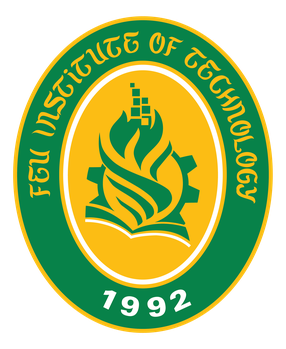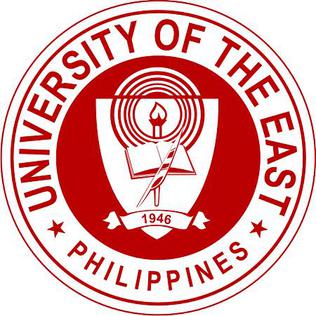The Xavier University – Ateneo de Cagayan, also known simply as the Ateneo de Cagayan or Xavier is a private, Catholic, coeducational, research basic and higher education institution. Xavier is operated by the Philippine Province of the Society of Jesus in Cagayan de Oro, Misamis Oriental, Philippines. Founded in 1933 as the Ateneo de Cagayan, it became the first higher education institution in Mindanao to receive a university status a year before its sister school Ateneo de Manila. It was given its present name in honor of the Jesuit missionary St. Francis Xavier.

Lyceum of the Philippines University also referred to by its acronym LPU is a private, non-sectarian, coeducational higher education institution located at intramuros in the City of Manila, Philippines. It was founded in 1952 by Dr. José P. Laurel, who was the third president of the Republic of the Philippines.

The University of the East, also known as UE, is a private university located in Manila, Philippines. Founded in 1946, business tycoon Lucio Tan acquired the university in 1990. UE was once labeled as the "largest university in Asia" when its enrollment in the past reached over 65,000 students.

FEU Institute of Technology, also referred to as FEU Tech, is a private, non-sectarian, coeducational higher education institution in Sampaloc, Manila, Philippines. It offers courses in the fields of Engineering and Computer Studies. Established in 1992 as East Asia Computer Center, Inc.(EACCI), an educational partnership of Asia Pacific Computer Technology Center, Intelligent Wave Inc., and Far Eastern University.

The Technological Institute of the Philippines is one of the country’s engineering colleges that also offers programs in computing, architecture, business, education, and the arts located in Metro Manila, Philippines. It is a private non-sectarian stock school founded on February 8, 1962, by a group of educators headed by Engineer Demetrio A. Quirino, Jr. and Dr. Teresita U. Quirino.

The University of the East, Caloocan Extension Campus is a private higher education institution in Caloocan, Philippines. It is one of the three campuses of the University of the East system. It is an autonomous unit headed by a chancellor, with the College of Business Administration, Arts and Sciences, Engineering, and Fine Arts. UE Caloocan is called Caloocan Campus to distinguish it from the Manila Campus on C.M. Recto Avenue.

The University of La Salette is a private Catholic, coeducational basic and higher education institution run by the Missionaries of Our Lady of La Salette in Santiago City, Philippines. Founded by the La Salettes in June, 1951, It is now one of the top performing universities in the region.

The Manila Adventist College or MAC(formerly known as Manila Adventist Medical Center and Colleges, Inc. or MAMC) is a private coeducational Christian tertiary health sciences institution. The campus is located inside the campus of Adventist Medical Center Manila within the city of Pasay, Metro Manila, Philippines and is run by the hospital. Both the colleges and hospital are run by the Seventh-day Adventist Church of the Philippines.
The University of Santo Tomas College of Education, popularly known as "UST-Educ", is the teacher education, nutrition and dietetics, food technology, and library and information science school of the University of Santo Tomas, the oldest and the largest Catholic university in Manila, Philippines. It was established in 1926 at Intramuros, Manila.

The Liceo de Cagayan University (LDCU) is a private non-sectarian basic and higher education institution in Cagayan de Oro, Philippines. It was founded in 1955 by Rodolfo N. Pelaez of Cagayan de Oro and his wife Elsa P. Pelaez of Cebu City.
The Laguna State Polytechnic University is a state university in the Province of Laguna, Philippines, with four regular campuses and several auxiliary sites. It is currently classified as SUC Level III.

Capitol University is a non-sectarian, co-educational private university located in Cagayan de Oro, Philippines. It is registered with the Securities and Exchange Commission as a stock corporation and operates with the authority of the Department of Education for its primary and secondary programs and the Commission on Higher Education for its tertiary, graduate and postgraduate programs.
A Bachelor of Science in Information Technology,, is a bachelor's degree awarded for an undergraduate program in the information technology. The degree is normally required in order to work in the Information technology industry.

Colegio de Montalban (CdM) is a government-funded university in Kasiglahan Village, Rodriguez, Rizal, Philippines. It was established on September 25, 2003 by virtue of Municipal Ordinance No. 03-24, and approved by the Sangguniang Bayan ng Rodriguez to provide vocational-technical and higher education to help alleviate poverty.
The Kalinga State University is a state university in the Philippines. It is mandated to provide advance institutions in arts, agricultural and natural sciences as well as in technological and professional fields. Its main campus is located in Tabuk, Kalinga.
The Catanduanes State University (CatSU) is a research and coeducational higher education institution and a green university in Catanduanes, Philippines. It is an ISO 9001:2015 certified public university.

The Olivarez College is a private, nonsectarian college along Dr. A. Santos Avenue, Parañaque, Philippines that offers academic programs in basic education, junior and high school, undergraduate, graduate and technical education levels. Founded in 1976, Olivarez College is the only school in Parañaque City that is accredited by the Philippine Accrediting Association of Schools, Colleges and Universities (PAASCU) and the Philippine Association of Colleges and Universities - Commission on Accreditation (PACUCOA). It is a member of the Universities and Colleges Athletic Association (UCAA) and National Capital Region Athletic Association (NCRAA).
The Siargao Island Institute of Technology is located on the north side of the Dapa township. Most of its buildings are in the northwest corner of Dapa, but some are spread across the north side of the town.
The college was established in 1948 as Abra Valley Junior College and was later renamed to Abra Valley College. In 1994, its name was again changed to Abra Valley Colleges. It is an academic institution located in Bangued, Abra, Philippines, which offers courses in nursing, criminology, hospitality and restaurant management, and law.
The Saint Paul University Surigao, also referred to as SPUS or SPU Surigao, is a private, Catholic basic and higher education institution run by the Sisters of Saint Paul of Chartres in Surigao City, Surigao del Norte, Philippines.











